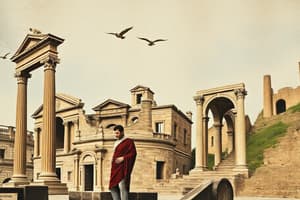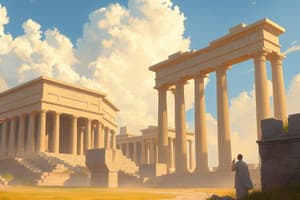Podcast
Questions and Answers
Roman society was monotheistic, believing in a single god or goddess.
Roman society was monotheistic, believing in a single god or goddess.
False (B)
The cult of Mithras, a Persian sun god, did not have any influence on Roman culture.
The cult of Mithras, a Persian sun god, did not have any influence on Roman culture.
False (B)
The Colosseum is admired today for its simplicity and minimalistic design.
The Colosseum is admired today for its simplicity and minimalistic design.
False (B)
Latin, the language of the Roman empire, has not had any impact on modern Western languages.
Latin, the language of the Roman empire, has not had any impact on modern Western languages.
The Pantheon does not reflect the Roman passion for art and craftsmanship.
The Pantheon does not reflect the Roman passion for art and craftsmanship.
The Aeneid was written by Cicero.
The Aeneid was written by Cicero.
Roman education focused on training students in mathematics and engineering skills.
Roman education focused on training students in mathematics and engineering skills.
The Roman Republic evolved into an empire in 27 BCE.
The Roman Republic evolved into an empire in 27 BCE.
The Patricians were part of the commoners in Roman society.
The Patricians were part of the commoners in Roman society.
Slaves in Roman society were granted citizenship rights and the protection of Roman law.
Slaves in Roman society were granted citizenship rights and the protection of Roman law.
The Roman Republic lasted from 509 BCE to 27 CE.
The Roman Republic lasted from 509 BCE to 27 CE.
Julius Caesar's assassination led to a period of civil war in Roman society.
Julius Caesar's assassination led to a period of civil war in Roman society.
The Eastern Roman Empire, also known as Byzantium, existed until 1453 CE.
The Eastern Roman Empire, also known as Byzantium, existed until 1453 CE.
The Roman Empire was not divided into two halves, Eastern and Western.
The Roman Empire was not divided into two halves, Eastern and Western.
Roman government relied on a decentralized system to exert its control over its vast territories.
Roman government relied on a decentralized system to exert its control over its vast territories.
The Roman Senate was the highest legislative and administrative body in Rome.
The Roman Senate was the highest legislative and administrative body in Rome.
Members of the equestrian class were at the top of the social hierarchy in ancient Rome.
Members of the equestrian class were at the top of the social hierarchy in ancient Rome.
Manumission was a practice that freed slaves from slavery and granted them Roman citizenship.
Manumission was a practice that freed slaves from slavery and granted them Roman citizenship.
The Freemen, or civis Romanus, formed the bulk of the Roman population.
The Freemen, or civis Romanus, formed the bulk of the Roman population.
The social hierarchy in ancient Rome allowed for easy movement from one social class to another.
The social hierarchy in ancient Rome allowed for easy movement from one social class to another.
Study Notes
Roman Society: A Deep Dive into Culture, Government, and Social Class
Roman Society, spanning from the legendary foundation of Rome in 753 BCE to its decline in the 5th century CE, has left an indelible mark on Western civilization. To understand this captivating era, we will explore the intricate web of Roman culture, government, and social class dynamics.
Roman Culture
Religion
Roman society was deeply rooted in the worship of multiple gods and goddesses, known as the Roman pantheon. This polytheistic belief system played a vital role in daily life, from festivals to personal offerings and sacrifices. The Roman gods were not only responsible for the natural world but were also believed to influence human behavior and relationships.
The cult of Mithras, a Persian sun god, was one of the most influential non-Roman religious movements that blended into Roman culture. Mystery schools flourished, and their teachings enriched the religious life of Roman society.
Art and Architecture
Roman art, architecture, and engineering are still admired today for their grandeur and sophistication. The Colosseum, for example, was an astounding symbol of Roman engineering and the dedication to entertainment. The Pantheon, with its remarkable domed ceiling, exudes the Roman passion for art and craftsmanship.
Language and Literature
Latin, the language of the Roman empire, has left an indelible mark on modern Western languages. Latin literature, too, marked the Roman era with celebrated works like the Aeneid by Virgil, the Satires by Horace, and the verse epistles of Cicero.
Education and the Arts
Roman education was centered around grammar, rhetoric, and law. The educational system aimed to train students in language and public speaking skills, enabling them to engage in civic life and participate in the political and legal systems.
Roman Government
Roman government evolved from a monarchy into a republic in the 4th century BCE and later transformed into an empire in 27 BCE.
The Roman Republic was a complex political system, with two consuls sharing the role of head of state. The Senate, comprised of ex-consuls, held the ultimate authority and oversaw the administration of the state.
The Roman Empire was a military autocracy, with the emperor as the ultimate authority. The emperor's power was reinforced by the Praetorian Guard, a corps of elite soldiers. The imperial power also relied on a complex bureaucracy that managed the empire's affairs.
Social Class
Roman society was highly stratified, with a distinct hierarchy that defined a person's place in society. The Patricians (nobility), Plebeians (commoners), and Slaves formed the social classes.
Patricians
The Patricians were the elite class, who enjoyed exclusive rights to political power, land, and wealth. They were part of a closed circle of power and privilege, and their status was hereditary.
Plebeians
Plebeians were the commoners, who formed the majority of the population. They were not eligible to hold high public office and had limited influence over the political system. Despite these limitations, Plebeians managed to assert their rights and played a crucial role in the political and social development of Rome.
Slaves
Roman society was built on the backs of slaves. Slaves were property, and their status was subordinate to their owners. Slaves were not granted citizenship rights, and they were denied the protection of Roman law.
In conclusion, Roman society was a complex and fascinating world that left an indelible mark on Western civilization. The intersection of culture, government, and social class provided a rich context for lives lived, played out in the shadow of Rome's grandeur and influence.
Studying That Suits You
Use AI to generate personalized quizzes and flashcards to suit your learning preferences.
Description
Delve into the captivating world of Roman society, exploring its culture, government, and the intricate dynamics of social classes. Uncover the polytheistic belief system, awe-inspiring art and architecture, the evolution of the Roman government from a republic to an empire, and the distinct hierarchy of Patricians, Plebeians, and Slaves.




